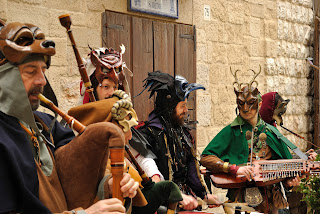
So, Altamura pays tribute to the king who actually has rebuilt the town, as reported in the banner of the municipality (Federicus me reparavit).
In my opinion, the main goal scored through this festival is having the community more aware of her own roots.
Rediscovering our roots make us more aware of our identity.
Identity is an awkward topic, in a globalized world, with millions of human beings leaving their own country to move either to Europe or America.
The leit motif of the ongoing festival is superstition.
Therefore, a panel of eminent guests were invited on 20th April to debate about it at the Mercadante theater: Rosanna Galantucci, Giacinto Forte, Francesca Ferrulli, Philippe Daverio, Alessandro Amapani and Fabrizio Vona.
Among them, there is Philippe Daverio (pictured), very popular in Italy thanks to his personal way to communicate art: smart and never pedantic.
Once on stage, Philippe, surrounded by flags red and white, colours which symbolize the Municipality of Altamura, turn to the Mayor and ask him: "what do red and white mean? Do they represent the compromesso storico?"
Coming back to Frederick II, Philippe Daverio says "according to Le Goff, in the 13th century, beside the two powers represented by army and church, a third category called scriptorium (intellectuals) took place in France and quickly spread all around Europe".

"This represents a turning point which Frederick II acknowledges immediately, and applies it to his own kingdom".
He continues "However, if the South of Italy has remained stuck to agriculture, instead of developing towards the rising capitalism, that's the Swabian's fault".
He says "I wish to mention a brilliant book, Uncommon sense. According to the author, in the past there were two figures, prophets and philosophers. Ancient Greece has given the birth to philosophers, whom thinking has forged the European culture".
"During the Middle Age, Arabics were forward-thinking. Indeed, among them superstition was forbidden, whereas science and philosophy were incentivated. Just to make an example, zero was introduced to Europe by the Arabics." Philippe adds.
He says "Finally, when Frederick II realizes that his ascendence may not be enough to rule over the Arabics of Sicily, then he persecute them, either killing or deporting them to Lucera, in Apulia".
The conference goes on for a couple of hours.
I quit the theater with so many causes for reflection.
The festival reaches its climax on the 24th, though.
The locals feels very much responsible for the positive outcome of the historical reenactment.
The atmosphere is sparkling: musicians, jugglers, walkers-on, twirlers.
There is everything which tourists may look for.
Finally, I strongly recommend you to experience Federicus next year.
Ps.
Click here, should you wish to view more pics








Hello Antonio, I'm trying to make a research on ancient philosphers and poets and writers of any kind, of the Greeter Greece Era, I found only a few that all belong to Tarentum (Archita, Aristosseno, Leonida, Livio Andronico,
ReplyDeleteClenias) and I was wondering if you could be so kind to add other names of greek apulian origin also from other colonies, like Callipolis and Metapontum. Thanks in advance should you be able and willing to give an help. Giuseppe
Dear Giuseppe, at the moment it doesn't come up to my mind any additional philosopher. However, I'd like to suggest you Pythagoras, who was born in Samo, established a school in Kroton (calabria) and died in Metaponto (https://en.wikipedia.org/wiki/Pythagoras). However, I'll keep in touch with you should I figure out any other ancient phylosopher of ancient Apulia. Ciao
Delete